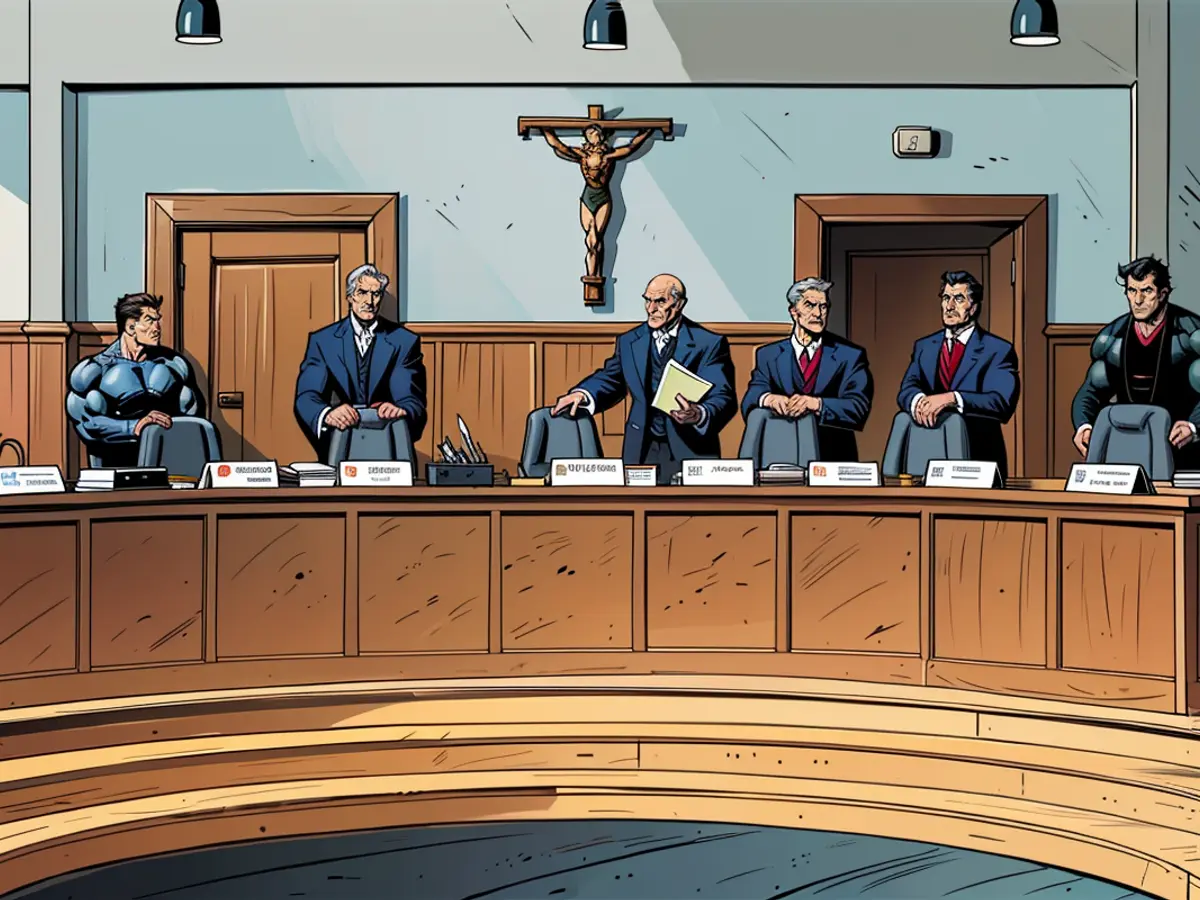Dispute over parliamentary group rights - AfD and Saar state parliament argue before constitutional court
The AfD fraction in Saarland feels disadvantaged by the Landtag and has therefore taken the case to the Constitutional Court of the state. Representatives of the fraction and the Landtag exchanged their differing views on fraction subsidies and the composition of an investigative committee in the hearing. A decision will not be made at a later time.
The AfD fraction criticizes, among other things, the distribution of fraction subsidies in the state budgets of the years 2023 and 2024 passed by the Saarland Landtag. This allegedly violates their rights to "equal participation in parliamentary proceedings".
According to the court president Roland Rixecker, the monthly payments have decreased from 46,000 to 39,600 Euro, after at the request of SPD and CDU, the distribution of subsidy components was changed. Concretely, the basic amount was reduced, and the opposition bonus and head amount were increased.
"Balance restored"
According to Raphael Schäfer (CDU), it was about restoring the "balance" which had arisen due to a reduction in the number of factions in the Landtag after the 2022 election. According to information from lawyer Georg Hermes, who represents the Landtag, the AfD fraction had received an additional 100,000 Euro: A "blessing" that had suddenly fallen into their lap, and then disappeared from the budget 2023.
The lawyer for the AfD fraction, Peter Richter, spoke against this as a "Night-and-Fog Operation" and arbitrariness. The representatives of CDU and SPD demanded that they admit "that it was only about taking money away from the AfD because they cannot stand it".
The SPD Landtag member Martina Hölzner said that the AfD had had the opportunity to express their views on the planned distribution of funds in the budget committee or to file an amendment. They had not done so.
Another procedure concerns the decision made a year ago on the size and composition of the so-called Yeboah investigative committee. In focus is a firebomb attack in September 1991 on an asylum seeker home in Saarlouis, where the Ghanaian Samuel Yeboah was killed.
Since the committee is only populated with five regular members, of whom three belong to the SPD and two to the CDU, the AfD sees a violation of their rights. According to lawyer Richter, both procedures before the Constitutional Court are about disadvantaging: financially as well as in terms of parliamentary participation opportunities. He knows of no single case where a fraction was excluded from an investigative committee. This is "unappetizing".
Lawyer Christofer Lenz, who represents the Landtag in the second procedure, argued that the decision to populate the committee with only five instead of seven members was "not subject to constitutional challenge". If in a seven-member committee, the AfD fraction, which has three representatives in the Landtag, had received a seat, and the CDU, which has 19 members, only two seats, that would be, in his opinion, disproportionate.
The court has a great need for consultation.
Court President Rixecker pointed out that investigative committees have coercive powers over civilians: They can summon them, compel them to testify, and demand information that infringes upon the personal rights of individuals. Through a change in seats, it is possible to obtain minority coalitions that are capable of "interfering with the freedoms of citizens." This is possible, it must be kept in mind.
The chairwoman of the investigative committee, Sevim Kaya-Karadag (SPD), said that there is a "substantive, constructive cooperation with all members" in the committee. An AfD deputy is represented as an advisory member in the committee.
According to President Rixecker, the court still has a great need for consultation. A decision is supposed to be made publicly known in writing within the next three months.
- The AfD fraction in Saarland believes they are disadvantaged in the Landtag and have brought the issue to the Constitutional Court of the state for consideration.
- Peter Richter, the lawyer representing the AfD fraction, criticized the changes made to fraction subsidies as a "Night-and-Fog Operation" and arbitrariness.
- Raphael Schäfer (CDU) explained that the changes were made to restore balance after a reduction in the number of factions in the Landtag following the 2022 election.
- The SPD Landtag member Martina Hölzner stated that the AfD had the opportunity to express their views on the budget distribution but did not take advantage of it.
- Another issue before the Constitutional Court is the composition of the Yeboah investigative committee, where the AfD sees their rights being violated due to having only an advisory member.
- The lawyer for the Landtag, Christofer Lenz, argued that the decision to have a five-member instead of a seven-member committee was not subject to constitutional challenge.
- The Constitutional Court's president, Roland Rixecker, mentioned that the coercive powers of investigative committees are significant and could potentially result in interfering with citizens' freedoms, which must be kept in mind.








